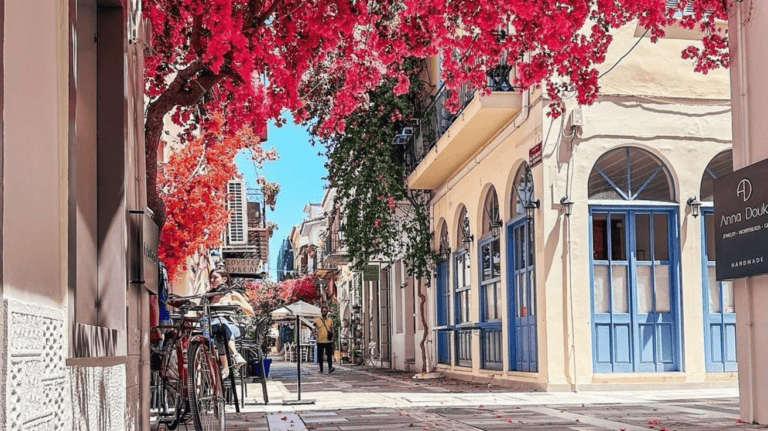What are the Best Times to Visit Greece for Good Weather, Fewer Crowds, and Affordable Prices
Greece, with its stunning landscapes, ancient history, and captivating islands, remains one of the world’s most popular tourist destinations. From the iconic ruins of Athens to the idyllic beaches of Santorini and Crete, Greece offers a unique blend of natural beauty and cultural richness. However, like any popular destination, choosing the right time to visit can make or break your experience. Factors such as weather, crowd sizes, and affordability play significant roles in planning the perfect Greek getaway.
To make the most of your trip, it’s important to consider when Greece offers the best weather, fewer tourists, and more affordable prices. These elements are closely tied to the time of year, with each season having its own unique advantages and disadvantages. Let’s explore the best times to visit Greece based on these factors.
Peak Season (June to August): Beautiful Weather but High Crowds and Prices

Weather:
Summer in Greece is synonymous with beautiful, hot, and sunny weather. From June to August, temperatures range from 25°C to 35°C (77°F to 95°F) in most parts of the country, making it ideal for beachgoers and sun-seekers. The famous Greek islands like Mykonos, Santorini, and Rhodes bask in sunshine, with clear skies and warm seas, perfect for swimming, sailing, and water sports. The southern parts of Greece, such as Crete, can get even hotter, with temperatures sometimes soaring to 40°C (104°F). It’s the quintessential Mediterranean summer.
Crowds:
Summer is also the busiest time in Greece. This is when tourists flock to the country in droves, especially in the Greek islands and famous archaeological sites. Santorini’s sunsets, for instance, are world-renowned, but during these months, you’ll be competing with hundreds or even thousands of other visitors to get a good spot for the view. Athens, too, is packed with visitors exploring the Acropolis and other historical landmarks. Beaches can be crowded, restaurants fully booked, and popular tourist attractions busy throughout the day.
Prices:
Prices in peak season are at their highest, with flights, accommodation, and tour packages costing significantly more than at other times of the year. Expect to pay premium rates for hotels, especially in well-known destinations like Santorini, Mykonos, and Rhodes. Even in less-touristy areas, prices rise in the summer as locals cater to the influx of international visitors. If budget is a concern, the peak season is the most expensive time to visit Greece.
Is it worth it?
If your main goal is to experience Greece’s famed summer sunshine and you don’t mind the hustle and bustle of fellow tourists, then the peak season is ideal. It’s also the best time for outdoor activities like swimming, diving, and hiking in the Greek islands. However, if you prefer more relaxed surroundings and are working within a budget, you may want to consider traveling during the shoulder seasons.
Shoulder Season (April to May & September to October): Balanced Weather, Fewer Crowds, and Lower Prices

Weather:
Spring (April to May) and early fall (September to October) offer some of the best weather for exploring Greece. In these months, temperatures are pleasantly warm, typically ranging from 15°C to 25°C (59°F to 77°F), perfect for outdoor activities without the intense heat of summer. The sea is still warm enough for swimming in September and early October, particularly in southern Greece and the islands. By mid-April, Greece bursts into bloom, with wildflowers carpeting the countryside, making it an especially scenic time to visit.
September and October also provide a more temperate climate, especially in the Aegean and Ionian islands, with still-warm seas and comfortably warm days, although the evenings can start to get cooler. These seasons are ideal for sightseeing, hiking, and exploring Greece’s many archaeological sites without the stifling summer heat.
Crowds:
The shoulder seasons see fewer tourists compared to the summer months. While popular destinations like Athens, Santorini, and Mykonos still attract visitors, the numbers are much more manageable. This allows for a more authentic and relaxed experience, especially when visiting top sites such as the Acropolis, Delphi, or Knossos on Crete. You’ll also have a better chance of enjoying quiet moments at picturesque beaches or during island-hopping adventures without being overwhelmed by crowds.
In April and May, many of the Greek islands are just waking up from the winter, and the tourist season has not yet reached its peak, meaning you can have many sites almost to yourself. In September and October, tourists begin to leave, making it easier to explore the islands and cities at a leisurely pace. The later you visit in the fall, the fewer tourists you will encounter.
Prices:
One of the best reasons to travel during the shoulder seasons is the affordability. Flights, accommodation, and food are generally cheaper compared to the summer months. Many hotels and resorts offer discounts to attract visitors in these less-busy times, and you can often find excellent deals on transportation and tours. With lower demand, you can score better deals on flights and ferries, and many local businesses, from tavernas to boutique shops, are more willing to negotiate or offer deals to travelers.
If you’re traveling on a budget, spring and fall are the best times to experience Greece without breaking the bank. The quality of your experience doesn’t diminish with the reduced price; in fact, you may find it more enjoyable because you can avoid the high-season stress.
Is it worth it?
For many travelers, the shoulder seasons provide the perfect balance. You still get the warm weather Greece is famous for, but without the overwhelming crowds and sky-high prices of the peak season. If you want to experience the culture, history, and natural beauty of Greece at a more leisurely pace—and save money while doing it—then spring and fall are the best times to visit.
Off-Season (November to March): Lower Prices, No Crowds, but Cooler Weather

Weather:
The winter months in Greece, from November to March, bring cooler temperatures and more unpredictable weather. In the mainland cities like Athens and Thessaloniki, temperatures hover around 10°C to 15°C (50°F to 59°F), with occasional rain. The Greek islands experience milder winters, but many services and businesses shut down during this period, especially in more remote areas. Snow is possible in the northern regions of Greece, and ski resorts like those on Mount Parnassus open during the winter months.
Despite the cooler weather, there are plenty of sunny days, particularly in southern Greece, where you can still enjoy outdoor activities like hiking, cycling, and visiting ancient ruins. The winter months are also perfect for exploring the many indoor cultural attractions, such as museums, galleries, and theaters, particularly in Athens.
Crowds:
Winter is the quietest time in Greece, with significantly fewer tourists. Popular tourist areas such as Santorini, Mykonos, and Crete can feel like ghost towns, with many hotels, restaurants, and attractions closed for the season. However, in major cities like Athens, Thessaloniki, and Nafplio, life continues as usual, and you’ll experience a much more local and authentic side of Greece. Sites like the Acropolis, Delphi, and Meteora are far less crowded, giving you a rare opportunity to explore them without the throngs of tourists.
In the islands, some of the larger towns, like Fira in Santorini or Chania in Crete, still have a few places open for winter visitors, but many island-hopping options and beach resorts close down entirely. However, if your goal is to explore Greece’s mainland treasures or experience the unique landscapes of Meteora, winter can be a great time to visit.
Prices:
Prices during the off-season are the lowest you’ll find all year. Flights, accommodation, and dining are all significantly cheaper, and you’ll often find deals on cultural attractions and excursions. Traveling in the winter allows you to stay at luxury hotels for a fraction of the price you’d pay during the summer, and domestic flights and ferry tickets can be much more affordable.
Keep in mind, however, that because of the reduced number of tourists, some services may be limited, particularly on the islands. While major cities like Athens and Thessaloniki continue to cater to visitors, smaller towns and rural areas may have fewer dining and accommodation options available.
Is it worth it?
Visiting Greece in the off-season offers a unique, quieter experience that can be perfect for those who want to avoid crowds and enjoy lower prices. However, it comes with the trade-off of cooler, less predictable weather and fewer options for island-hopping and beach activities. If you’re interested in exploring the cultural and historical aspects of Greece and don’t mind the cooler temperatures, winter is a great option. It’s also ideal if you want to experience a more authentic, local side of Greece, as you’ll be visiting at a time when fewer tourists are around.
Special Considerations: Holidays and Events

When planning your trip to Greece, it’s also worth considering specific holidays and events that might impact your visit. For example, Easter in Greece (usually in April) is one of the most important holidays, and many towns and cities celebrate with elaborate processions, church services, and feasts. Visiting during Greek Easter can provide a unique cultural experience, though it can also mean increased crowds and prices around the holiday.
Other events, like the Athens and Epidaurus Festival (which runs from June to August), showcase world-class theater performances and concerts in historic venues, such as the ancient theater of Epidaurus and the Odeon of Herodes Atticus in Athens. If you’re a fan of the arts, timing your trip to coincide with this festival could add another layer of enjoyment to your visit.
Conclusion: Finding the Perfect Time for Your Greek Adventure
The best time to visit Greece depends on your travel priorities. If you’re seeking sun, sea, and the classic summer experience, then the peak season is ideal—but be prepared for higher costs and larger crowds. For those who prefer a balance of good weather, fewer tourists, and more affordable prices, the shoulder seasons in spring and fall offer the best of all worlds. And if you’re looking for a quieter, budget-friendly escape and don’t mind cooler weather, winter in Greece can be a rewarding and peaceful time to explore the country’s rich history and culture.
Ultimately, no matter when you choose to visit Greece, this enchanting country offers something special year-round.






